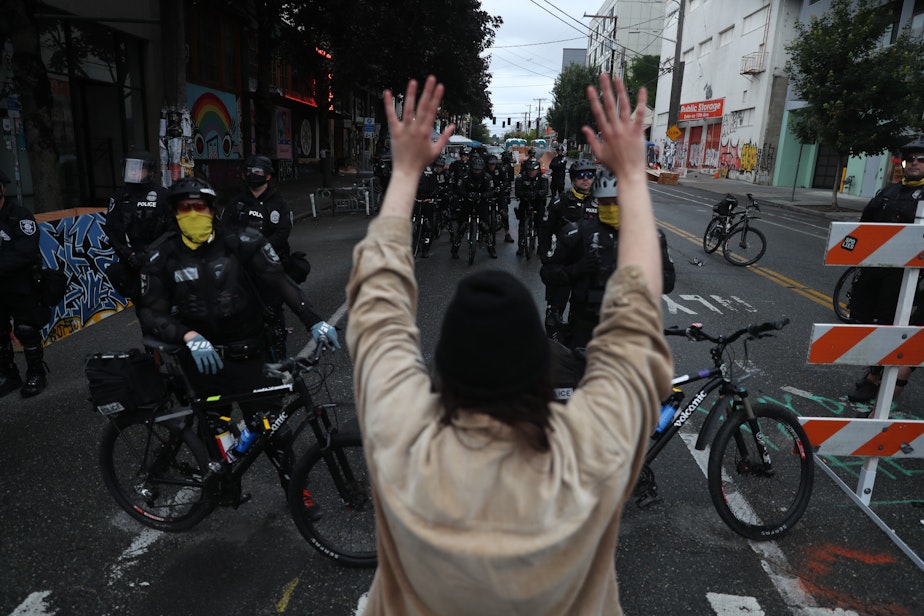Needing body armor to protest in Seattle violates constitutional rights, lawsuit argues

Several protesters are suing the City of Seattle over the increasing necessity of showing up to protests in protective wear.
Their attorney is also petitioning the U.S. District Court for the Western District of Washington to enforce a city ordinance banning the use of tear gas and other crowd control weapons against demonstrators.
The court filing argues that the city has infringed on its residents’ constitutional rights to peaceably assemble and receive equal protection under the law.
Civil rights demonstrations have been ongoing in Seattle since late May, and so has the Seattle Police Department’s use of chemical irritants and projectiles as measures of crowd control. Civilians have been left with a host of injuries including chemical burns, visual impairments, scrapes, and bruises.
It has become common to see demonstrators, who have come to expect harsh crowd control actions from Seattle Police, sporting protective gear such as helmets and respirators. Umbrellas, repurposed as shields, have also become a centerpiece at local demonstrations.
"We started hearing stories about folks who were spending $400 to $500 on gear to try to be able to protest the streets," said Talitha Hazelton, who is representing clients on the new lawsuit. She cited an anecdotal uptick of demonstrators patronizing local military surplus stores in recent months.
Hazelton’s court filing argues that this cost means the city has neglected to provide equal protection under the law.
She explained: "When we hear this community talking about how it's so cost prohibitive, there's actually a name for that ... called equal protection. You shouldn't have to be rich to be able to air your grievances via your First Amendment rights."
Sponsored
A July 25 demonstration on Capitol Hill near the Seattle Police Department's East Precinct culminated in a violent clash between officers and protesters. Seattle Police declared the confrontation a riot, citing extensive property damage and the launching of explosives at officers. Forty-seven demonstrators were arrested.
The department said that 59 officers had been injured and shared photos of said injuries. But legal observers there that day with the National Lawyers Guild have pointed to the police, in multiple instances, being the victims of friendly fire.
The Seattle City Council on June 15 unanimously voted to bar the use of tear gas, rubber bullets, and several other crowd control weapons by the Seattle Police Department amid public pressure to demilitarize and rein in officers' use of force against protesters.
However, the ordinance, which was set to take effect on July 26, was temporarily suspended by U.S. District Judge James Robart, after both city and U.S. Department of Justice officials contended that the ordinance would interfere with the Seattle Police Department's compliance with the federal consent decree, entered in 2012, that has governed the department's use of force practices.
Sponsored
Sponsored
The lawsuit filed on Monday by protesters and Hazelton accompanied a motion for the court to effectively reverse Robart's earlier decision, and compel the city to implement the crowd control weapons ban.
The motion argues that "because the Seattle Police Department has acted above and outside the law in dispensing its unbridled force ... the government effect is to establish a de facto protest tax: individual protesters subjected to SPD’s unabated and indiscriminate violence now must purchase cost- prohibitive gear to withstand munitions."
Federal Judge Richard Jones on June 17, in a separate ruling, issued a preliminary injunction extending a ban on the department’s use of “less lethal” chemical and projectile weapons against peaceful protesters through September 30, in response to a joint lawsuit filed by Black Lives Matter Seattle-King County and the ACLU of Washington.
The order, however, allows officers to take "necessary, reasonable, proportional, and targeted action" in response to a "specific and imminent threat."
Seattle Police, despite a growing public outcry against the practices, have continued to use chemical and incendiary crowd control agents, and have been accused of doing so indiscriminately and without clear warning.
Sponsored
Police Chief Carmen Best in June told KUOW's Morning Edition that while demonstrators — including her own daughter and son-in-law — have collectively been peaceful, others embedded among them have attacked officers with rocks and bottles, prompting police to use force.
"Our response is typically to disperse the crowd," Best said. "But the effect of that is that many people who are there not doing anything suffer the results of that, and so it's definitely something that needs to be looked at more."
Hazelton, in her motion to the U.S. District Court, wrote that the public interest outweighs any interests of the city regarding the use of crowd control weapons.
"It's so frustrating that it requires all these legal engines for something that is very clearly a public will, and when there is a clear public harm," she said. "And now what the public willed is delayed because of a legal quandary."
Read the court filing below:

